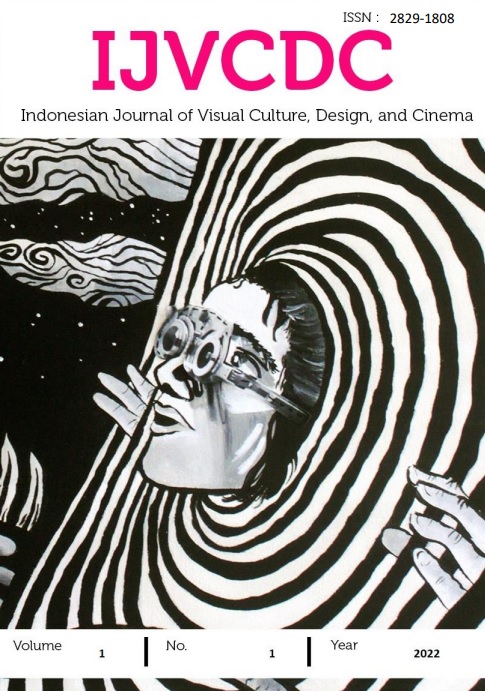User Interface (UI) Design as A Visual Comunication Medium for Composting Waste Management Education
DOI:
https://doi.org/10.21512/ijvcdc.v1i1.8253Keywords:
visual communication, website, composting, waste management, educationAbstract
As the fourth leading country with the largest population, the demand for needs in Indonesia has increased significantly, especially in primary needs such as food and household materials. With the massive amount of waste and lack of awareness, the waste we produce is thrown away to the landfill, without knowing the effects it might cause. In this situation, there are many people throwing garbage in the wrong place. The awareness amongst youth in Indonesia in regard to excessive waste and composting as a solution to act on it is, still low. In the effort of collecting data, literature studies from different sources are used, this research also conducts in-depth interviews with experts in the field. A creative solution of creating a digital platform in the form of a website that called Feed the Soil is made to help raise the awareness to solve the problem. With an attractive visual and interactive activity, It would be easier for the targeted audience to be able to increase their interest and boost their knowledge. As a result, the awareness is raised, and information can be easily understood and received in a fun and unordinary way. Moreover, further research is still needed to provide more depth to the platform and implementation.
References
Ariel, Y., & Avidar, R. (2015). Information, Interactivity, and Social Media. Altantic Journal of Communication, 23, 19–30.
Ayilara, M. S., Olanrewaju, O. S., Oluranti, B. O., & Odeyemi, O. (2020). Review: Waste Management through Composting: Challenges and Potentials. Sustainability, 12(4456).
Brown, S. (2016). Greenhouse Gas Accounting for Landfill Diversion of Food Scraps and Yard Waste. Compost Science & Utilization, 24(1), 11–19.
Cassidy, T. D. (2011). The Mood Board Process Modeled and Understood as a Qualitative Design Research Tool. Fashion Practice, 3(2), 225–252.
DeWitt, A. J. (2010). Examining the Order Effect of Website Navigation Menus With Eye Tracking. Journal of Usability Studies, 6(1), 39–47.
Economist, T., & Unit, I. (2016). Industries in 2016.
Efriana, L. (2021). Problems of Online Learning During Covid-19 Pandemic in EFL Classroom and the Solution. JELITA, 2(1), 38–47.
Environment, V. (2016). Organic Waste. Environment Victoria.
Fox, D., Ioannidi, E., Sun, Y.-T., Jape, V. W., Bawono, W. R., Zhang, S., & Perez-Cueto, F. J. . (2018). Consumers with high education levels belonging to the millennial generation from Denmark, Greece, Indonesia and Taiwan differ in the level of knowledge on food waste. International Journal of Gastronomy and Food Science, 11, 49–54.
Hu, S. (2020). Composting 101. NRC. https://www.nrdc.org/stories/composting-101
Iswara, M. A. (2020). Trackling Food Loss, Waste Could Benefit Indonesia on Many Fronts: Experts. The Jakarta Post.
Jakarta, P. S. S. P. D. (2019). Rata-Rata Jumlah Sampah yang Masuk Ke Tempat Pembuangan Sampah Terakhir (TPST) Bantar Gebang, 2019. Website.
Kehutanan, K. L. H. dan. (2021). Gerakan Pilah Sampah dari Rumah Resmi Diluncurkan. Website.
McNeil, P. (2012). The Designer’s Web Handbook: What You Need to Know to Create for the Web. HOW Books.
Pressman, A. (2019). Design Thinking: : a Guide to Creative Problem Solving for Everyone (1st ed.). Routledge.
Purbasari, M., Sasmoko, Rombe, O. S. C., & Manalu, S. R. (2021). A Touch of Indonesian Local Wisdom for the Concept of User Interface (UI) Design of Nusantara Traditional Wastra Digital Repository (NTWDR). IOP Conf. Series: Earth and Environmental Science. https://doi.org/10.1088/1755-1315/794/1/012120
Singh, M., & Singh, G. (2018). Impact of social media on e-commerce. International Journal of Engineering & Technology, 7, 21–26.
Swasty, W., & Adriyanto, A. R. (2017). Does Color Matter on Web User Interface. CommIT (Communication & Information Technology) Journal, 11(1), 17–24.
Yamani, H. A. (2021). A Conceptual Framework for Integrating Gamification in eLearning Systems Based on Instructional Design Model. International Journal of Emerging Technologies in Learning, 16(4), 14–33. https://doi.org/10.3991/ijet.v16i04.15693
Downloads
Published
How to Cite
Issue
Section
License
Copyright (c) 2022 IJVCDC (Indonesian Journal of Visual Culture, Design, and Cinema)

This work is licensed under a Creative Commons Attribution-NonCommercial-ShareAlike 4.0 International License.
Authors who publish with this journal agree to the following terms:
a. Authors retain copyright and grant the journal right of first publication with the work simultaneously licensed under a Creative Commons Attribution License - Share Alike that allows others to share the work with an acknowledgment of the work's authorship and initial publication in this journal.
b. Authors are able to enter into separate, additional contractual arrangements for the non-exclusive distribution of the journal's published version of the work (e.g., post it to an institutional repository or publish it in a book), with an acknowledgment of its initial publication in this journal.
c. Authors are permitted and encouraged to post their work online (e.g., in institutional repositories or on their website) prior to and during the submission process, as it can lead to productive exchanges, as well as earlier and greater citation of published work.
USER RIGHTS
All articles published Open Access will be immediately and permanently free for everyone to read and download. We are continuously working with our author communities to select the best choice of license options, currently being defined for this journal as follows: Creative Commons Attribution-Share Alike (CC BY-SA)







 This work is licensed under a
This work is licensed under a 